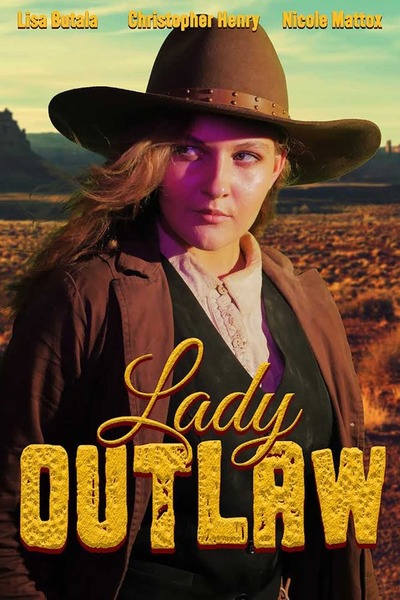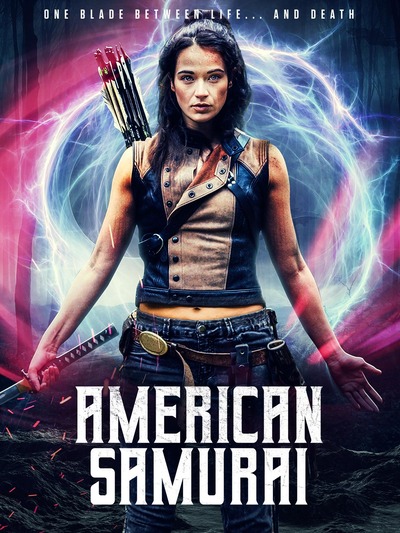★★★
“I’ve seen crazy before… And trouble always follows crazy.”
 This low-budget Western does a lot of things right, but is not able to tie up all the loose ends in the final act. Most of which are ends that never needed to be loose in the first place. It takes place in 1890’s Oklahoma, when the gang of George ‘Bittercreek’ Newcomb (Henry) is trying to head back home. The gang includes a female outlaw, Rose Dunn (Butala), who is perhaps a little more moral than some members of the gang e.g. Tom, played by veteran villain Michael Ochotorena, this time covering up his impressive face tattoos. The situation comes to a head after Rose rescues a saloon girl, Ellie (Mattox), who just shot a man dead.
This low-budget Western does a lot of things right, but is not able to tie up all the loose ends in the final act. Most of which are ends that never needed to be loose in the first place. It takes place in 1890’s Oklahoma, when the gang of George ‘Bittercreek’ Newcomb (Henry) is trying to head back home. The gang includes a female outlaw, Rose Dunn (Butala), who is perhaps a little more moral than some members of the gang e.g. Tom, played by veteran villain Michael Ochotorena, this time covering up his impressive face tattoos. The situation comes to a head after Rose rescues a saloon girl, Ellie (Mattox), who just shot a man dead.
This won’t be the last woman Rose ends up saving, much to the chagrin of George. For they have enough trouble as is, being hunted by the dogged Marshal Hixon (Gillum). In an effort to shake the pursuers off, George and Rose head into Apache country, meaning they now also must deal with both no water and bad water. This seems a sequel of sorts to Mauser’s earlier Lady Lawman, which I haven’t seen – its protagonist seems to show up in an end-credit sequence. On the evidence here, I might have to check it out, because this is a decent character-driven piece. Although certainly chatty rather than shooty, it is largely interesting, especially courtesy of Ellie. She brings every scene she’s in to life, dragging the rest of the cast with her, if necessary.
In particular, it’s as a result of her efforts that Dunn herself comes to life, after initially seeming like a bit of a stilted character. This may be intentional, a necessary survival technique in the otherwise all-male gang. Ellie brings Rose out of her shell, and by the ninety minute mark, we’d had a good arc for her, creating a fully rounded heroine, and a decent story. The problem is, the film runs 110 minutes. After forgetting about him in the middle, the film suddenly remembers Hixon, having to wrap up his story-line in a sequence which feels like an afterthought. There’s then an extended ending, and it seems equally tacked-on and unnecessary. This is definitely a case where less would have been more.
There are a few gunfights, which provide the bulk of the action. These are marginally competent, and rather static, consisting mostly of people standing around while popping off shots at each other. The best sequence, for me, was the battle between Tom and Rose, a nasty bit of ground and pound, where both participants know only one is going to survive. The limitations on this front didn’t impact my interest, and until the final section, the performances and well-written dialogue held my attention effectively. There’s a lesson to be learned here for other low-budget filmmakers. If your foundation is solid, audiences will be willing to forgive the limited resources.
Dir: Brett William Mauser
Star: Stars: Lisa Butala, Christopher Henry, Nicole Mattox, Wes Gillum





 I guess it’s equality at work. This film, written by, starring and directed by women, proves that they are every bit as capable as men… Of knocking out vaguely competent, forgettable, low-to-mid tier action films, anyway. #GirlBoss This is another in the ongoing series of Tubi Originals I’ve reviewed here, including
I guess it’s equality at work. This film, written by, starring and directed by women, proves that they are every bit as capable as men… Of knocking out vaguely competent, forgettable, low-to-mid tier action films, anyway. #GirlBoss This is another in the ongoing series of Tubi Originals I’ve reviewed here, including  If I’d realized earlier this was by the director of the underwhelming, non-GWG film,
If I’d realized earlier this was by the director of the underwhelming, non-GWG film,  There are reviews which are easy to write, because – good or bad – the subject generates a lot to talk about. This is not one of those. It’s a bland slice of semi-urban fantasy, which just… sits there, the literary equivalent of a bowl of vanilla pudding. It’s not good, nor is it bad enough to be memorable. It merely exists, remarkable mostly in how unremarkable it is. Put it this way, I finished it less than 24 hours ago, and I can’t even remember the heroine’s name, so little impression was made. Instead of writing, I find myself almost preferring the Star Trek musical episode Chris is watching next to me. And I don’t really like Star Trek. Or musical episodes.
There are reviews which are easy to write, because – good or bad – the subject generates a lot to talk about. This is not one of those. It’s a bland slice of semi-urban fantasy, which just… sits there, the literary equivalent of a bowl of vanilla pudding. It’s not good, nor is it bad enough to be memorable. It merely exists, remarkable mostly in how unremarkable it is. Put it this way, I finished it less than 24 hours ago, and I can’t even remember the heroine’s name, so little impression was made. Instead of writing, I find myself almost preferring the Star Trek musical episode Chris is watching next to me. And I don’t really like Star Trek. Or musical episodes.  I was a little nervous on reading the IMDb trivia section: “Three motorcycle clubs participated as extras and offered technical advice.” If this sucked and I gave it a bad review, would I get a visit from a group of annoyed bikers, offering me ‘technical advice’ with a wrench? Turns out I needn’t have worried. While low-budget by Hollywood standards, it has some interesting ideas, and the execution is competent enough to pass muster. The events here take place after the collapse of the United States, when everywhere West of the Mississippi has basically been left to fend for itself. In this part of Nevada, that means two biker gangs, the Skoners and the Gypsies are fighting for control.
I was a little nervous on reading the IMDb trivia section: “Three motorcycle clubs participated as extras and offered technical advice.” If this sucked and I gave it a bad review, would I get a visit from a group of annoyed bikers, offering me ‘technical advice’ with a wrench? Turns out I needn’t have worried. While low-budget by Hollywood standards, it has some interesting ideas, and the execution is competent enough to pass muster. The events here take place after the collapse of the United States, when everywhere West of the Mississippi has basically been left to fend for itself. In this part of Nevada, that means two biker gangs, the Skoners and the Gypsies are fighting for control. Reaching the summit of Mount Everest once is a remarkable achievement, done by only a few thousand people in history, with hundreds having died in the attempt. But what about climbing the world’s highest peak on no less than
Reaching the summit of Mount Everest once is a remarkable achievement, done by only a few thousand people in history, with hundreds having died in the attempt. But what about climbing the world’s highest peak on no less than  I only remembered about this when looking at our preview for last year, and realizing I’d not heard anything more about it. Turns out it was released on April 26th, to what was apparently “limited theatres,” the same day it hit on-demand. I must have missed the memo. So, here we are, and it’s very much a bit of a mixed bag. The scenario is interesting, if vague. Initial tension building is well-done, but the further it went on, the more it struggled to hold my interest. It’s a post-apocalyptic scenario, with the oxygen level of the atmosphere rapidly depleted to a lethally low percentage. This wiped out almost everyone – though where all the corpses went is one of many unanswered questions.
I only remembered about this when looking at our preview for last year, and realizing I’d not heard anything more about it. Turns out it was released on April 26th, to what was apparently “limited theatres,” the same day it hit on-demand. I must have missed the memo. So, here we are, and it’s very much a bit of a mixed bag. The scenario is interesting, if vague. Initial tension building is well-done, but the further it went on, the more it struggled to hold my interest. It’s a post-apocalyptic scenario, with the oxygen level of the atmosphere rapidly depleted to a lethally low percentage. This wiped out almost everyone – though where all the corpses went is one of many unanswered questions. I’m slightly grading this on a curve, because this is likely the best of the low-budget modern blaxploitation movies I’ve seen, by some margin. By “normal” standards, that still falls some way short of Oscar-winning, with the limited resources still being obvious at some point. But compared to some of the other entries I’ve sat through, this is a palpable improvement, avoiding many of the worst cliches of the genre, in favor of a story which has had some attention given to it. It’s not an African-American knockoff of Scarface, like so many others, and does not entirely rely on a soundtrack of bad rap songs by the director’s pals. That alone puts it ahead of the pack.
I’m slightly grading this on a curve, because this is likely the best of the low-budget modern blaxploitation movies I’ve seen, by some margin. By “normal” standards, that still falls some way short of Oscar-winning, with the limited resources still being obvious at some point. But compared to some of the other entries I’ve sat through, this is a palpable improvement, avoiding many of the worst cliches of the genre, in favor of a story which has had some attention given to it. It’s not an African-American knockoff of Scarface, like so many others, and does not entirely rely on a soundtrack of bad rap songs by the director’s pals. That alone puts it ahead of the pack.
 It’s funny. You wait ages for an action heroine novel set in Arizona, then two show up at once. Right on the heels of
It’s funny. You wait ages for an action heroine novel set in Arizona, then two show up at once. Right on the heels of